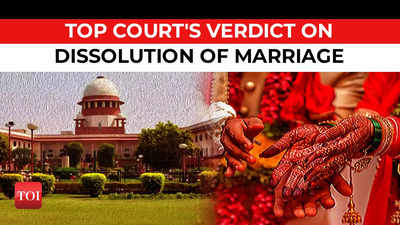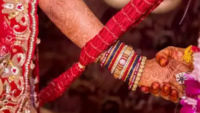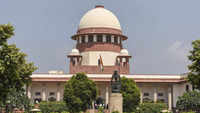

NEW DELHI: The Supreme Court on Monday ruled that it can dissolve a marriage on the grounds of "irretrievable breakdown" by invoking its special powers under Article 142 of the Constitution.
A constitution bench of Justices Sanjay Kishan Kaul, Sanjiv Khanna, Abhay S Oka, Vikram Nath and JK Maheshwari held that the six-month waiting period prescribed under the Hindu Marriage Act can also be dispensed with.



What was the case all about?
The Supreme Court was dealing with more than one set of questions including what could be the broad parameters for the exercise of powers under Article 142 to dissolve a marriage between consenting parties without referring them to the family court to wait for the mandatory period prescribed under section 13-B of the Hindu Marriage Act (HMA).
The case was referred to a five-judge bench nearly five years ago by a division bench in a transfer petition.
The original case was filed in 2014, titled Shilpa Sailesh vs. Varun Sreenivasan, where the parties sought a divorce under Article 142, stating that their marriage had irretrievably broken down.
What is Article 142 of the Constitution and Section 13-B of the HMA?
Article 142 of the Constitution deals with the enforcement of decrees and orders of the apex court to do "complete justice" in any matter pending before it.
As per Article 142(1), a decree passed or an order made by the apex court is executable throughout the territory of India.
The apex court said that divorces can be granted through such a route on the ground of irretrievable breakdown of marriage, adding that it can be possible even when one of the parties opposes such a decree.
"This discretionary power is to be exercised to do ‘complete justice’ to the parties, wherein this court is satisfied that the facts established show that the marriage has completely failed and there is no possibility that the parties will cohabit together, and continuation of the formal legal relationship is unjustified. The court, as a court of equity, is required to also balance the circumstances and the background in which the party opposing the dissolution is placed".
Meanwhile, Section 13-B of the Hindu Marriage Act deals with divorce by mutual consent and sub-section (2) to this provision provides, after the first motion has been passed, the parties would have to move the court with the second motion, if the petition is not withdrawn in the meanwhile, after six months and not later than 18 months of the first motion.
Is seeking divorce via this route a matter of individual right?
The bench clearly stated that grant of divorce on the ground of irretrievable breakdown of marriage is not a matter of right, but a discretion which is to be exercised with great care and caution.
"This court should be fully convinced and satisfied that the marriage is totally unworkable, emotionally dead and beyond salvation and, therefore, dissolution of marriage is the right solution and the only way forward. That the marriage has irretrievably broken down is to be factually determined and firmly established," it said.
What is the six-month waiting period?
A court grants a "cooling off" period of six months to a couple seeking divorce with the intent to save the marriage.
After the end of six months, the couple may decide to reunite or proceed with a divorce.
However, the apex court has said that the period of six months can be dispensed with if certain requirements and conditions are met.
"The time gap is meant to enable the parties to cogitate, analyse and take a deliberated decision. The object of the cooling off period is not to stretch the already disintegrated marriage, or to prolong the agony and misery of the parties when there are no chances of the marriage working out. Therefore, once every effort has been made to salvage the marriage and there remains no possibility of reunion and cohabitation, the court is not powerless in enabling the parties to avail a better option, which is to grant divorce. The waiver is not to be given on mere asking, but on the court being satisfied beyond doubt that the marriage has shattered beyond repair," it said.
What are the factors that will be considered by the court to decide if the marriage if irretrievably broken?
The court should consider the following factors:
* The period of time the parties had cohabited after marriage
* When the parties had last cohabited
* The nature of allegations made by the parties against each other and their family members
* The orders passed in the legal proceedings from time to time, cumulative impact on the personal relationship
* Whether, and how many attempts were made to settle the disputes by intervention of the court or through mediation, and when the last attempt was made, etc.
* The period of separation should be sufficiently long, and anything above six years or more will be a relevant factor.
Moreover, these facts have to be evaluated keeping in view the economic and social status of the parties, including their educational qualifications, whether the parties have any children, their age, educational qualification, and whether the other spouse and children are dependent, in which event how and in what manner the party seeking divorce intends to take care and provide for the spouse or the children.
Furthermore, question of custody and welfare of minor children, provision for fair and adequate alimony for the wife, and economic rights of the children and other pending matters, if any, are relevant considerations.
The court clarified that it does not want to codify these factors as they are situation-specific and that the above mentioned factors are "illustrative".
Can parties directly approach the SC?
While holding that irretrievable breakdown of marriage can be a ground to grant divorce by invoking powers under Article 142 of the Constitution, the Supreme Court clarified that a party cannot file a writ petition under Article 32 of the Constitution of India and seek relief of dissolution of marriage on the ground of irretrievable breakdown of marriage directly from it.
Article 32 gives the right to individuals to move to the apex court to seek justice when they feel that their right has been 'unduly deprived'.
Referring to a verdict delivered earlier by a two-judge bench of the apex court, the bench said it was rightly held that any such attempt must be spurned and not accepted, as the parties should not be permitted to file a writ petition under Article 32 or Article 226 of the Constitution before the high court and seek divorce on the ground of irretrievable breakdown of marriage.
“The reason is that the remedy of a person aggrieved by the decision of the competent judicial forum is to approach the superior tribunal/ forum for redressal of his/ her grievance. The parties should not be permitted to circumvent the procedure by resorting to the writ jurisdiction under Article 32 or 226 of the Constitution of India, as the case may be,” it said.
The bench said a party cannot file a writ petition under Article 32 and seek relief of dissolution of marriage directly from the apex court.
“The legislature and the courts treat matrimonial litigations as a special, if not a unique, category. Public policy underlying the legislations dealing with family and matrimonial matters is to encourage mutual settlement. ” it said.